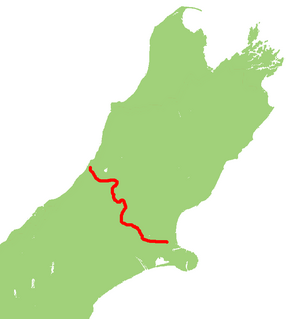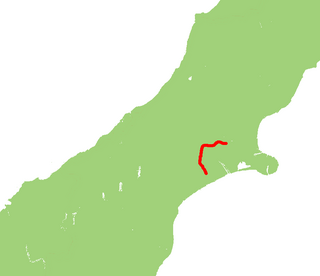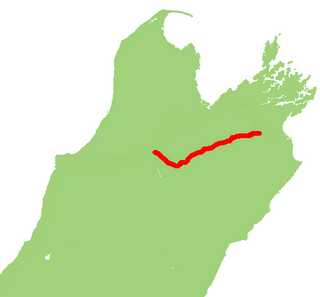This article does not cite any sources .(February 2008) (Learn how and when to remove this template message) |
| State Highway 65 | ||||
|---|---|---|---|---|
 | ||||
| Route information | ||||
| Maintained by NZ Transport Agency | ||||
| Length | 71.7 km (44.6 mi) | |||
| Major junctions | ||||
| North end | SH 6 near Murchison | |||
| South end | SH 7 at Springs Junction | |||
| Location | ||||
| Primary destinations | Shenandoah, Maruia | |||
| Highway system | ||||
| ||||
State Highway 65 (also known as the Shenandoah Highway) is a New Zealand state highway in the South Island. It is 71 km long and runs south to north down the Maruia river valley from SH 7 at Springs Junction, 15 km west of the main divide at the Lewis Pass, to SH 6 in the Buller Gorge, 11 km west of Murchison. It forms part of the most direct route between Christchurch and Nelson. It takes its name from a small settlement toward its northern end.
The New Zealand state highway network is the major national highway network in New Zealand. Nearly 100 roads in the North and South Islands are state highways. All state highways are administered by the NZ Transport Agency.

The South Island, also officially named Te Waipounamu, is the larger of the two major islands of New Zealand in surface area; the other being the smaller but more populous North Island. It is bordered to the north by Cook Strait, to the west by the Tasman Sea, and to the south and east by the Pacific Ocean. The South Island covers 150,437 square kilometres (58,084 sq mi), making it the world's 12th-largest island. It has a temperate climate.

Springs Junction is a significant road junction in New Zealand that connects two major highways, State Highway 7 and State Highway 65.
Contents
The road is sealed and two-lane, with some single-lane bridges. The surrounding country is used for pastoral farming (beef and dairy) with some forestry on the surrounding hills. Springs Junction is the only locality with fuel or food along the route while Maruia is the largest settlement along the route.

Maruia is a locality in the West Coast region of New Zealand. The Shenandoah Highway passes through it. Murchison is 65 km north, the Lewis Pass is 39 km to the south-east, and Reefton is 63 km west by road. The Maruia River flows past to the west.

Maruia Falls, a 5-m waterfall near the road, did not exist prior to the 1929 Murchison earthquake (magnitude 7.8).

The 1929 Murchison earthquake occurred at 10:17 am on 17 June. It struck the Murchison region of the South Island, with an estimated magnitude of 7.3, and was felt throughout New Zealand. There were 17 casualties, mostly as a result of landslides triggered by the earthquake. The rumbling sound of the earthquake was loud enough to be heard at New Plymouth, more than 250 km (155 mi) away.
The surface wave magnitude scale is one of the magnitude scales used in seismology to describe the size of an earthquake. It is based on measurements in Rayleigh surface waves that travel primarily along the uppermost layers of the Earth. It is currently used in People's Republic of China as a national standard for categorising earthquakes.












